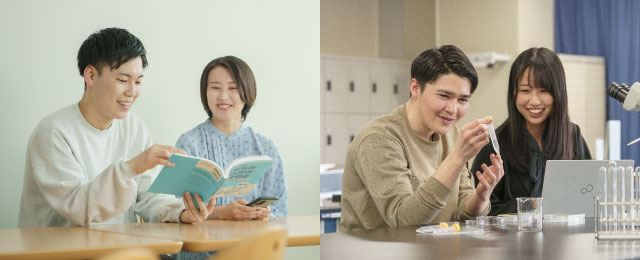







Home > Admissions > Admission Policy > Graduate School of Regional Education, Art and Science
The Graduate School of Regional Education, Art and Science consists of the two majors of Clinical Psychology, and Art and Culture. It adopts an educational method that emphasizes practical training and seminars in a bid to cultivate expertise and skills in students. The graduate school offers classes that link and merge majors and fields. In addition, students can develop practical abilities to solve problems through the planning and running of projects conducted at clinical psychology institutions, culture centers, and sports facilities in Yamagata Prefecture.
The graduate school instills advanced expertise, techniques, and skills in the fields of clinical psychology, art, and sports. Furthermore, the programs foster talented professionals and leaders who can contribute to the healthy development of local communities in their respective fields.
The Clinical Psychology Major fosters sophisticated experts who can provide mental care in the fields of education, welfare, medicine, insurance, law and reform, and industry, by using clinical psychology and other psychological knowledge and skills. Specifically, it develops experts who can provide advanced mental care services as clinical psychologists at mental hospitals, school counselors at junior high schools or psychotherapists for abused children at children's institutions.
The Clinical Psychology Major is designated as a Type 1 graduate school program for fostering clinical psychologists by the Foundation of the Japanese Certification Board for Clinical Psychologists.
The Art and Culture Major is composed of the three fields of Music, Art, and Sports and develops highly skilled professionals who are instrumental in reinvigorating culture in these fields.
Students take classes corresponding to their discipline and further cultivate advanced professional skills and leadership on the basis of the core knowledge and skills acquired during undergraduate years. Their training will enable them to assume leadership roles in local communities in their respective fields. Placing opera, chamber music and orchestra music in the center of education, the major cultivates the abilities in students to coordinate and manage musical events through the planning and running of concerts so that they can contribute to developing and promoting art and culture of local communities and society.
Building on the basic knowledge and skills of art acquired during undergraduate years, students gain enhannced professional skills and leadership in specialty fields, such as painting, sculpture, handicraft and design. Learners also develop practical abilities in cultural policy and arts management to be able to contribute to developing and promoting art and culture in local communities and society. Students acquire hands-on skill through the planning and running of cultural events held by public cultural facilities, local organizations, and the private sector.
Students study skills and advanced theories of various sports to become leaders in improving competition power. While cultivating the ability to plan sporting activities, they also develop the coordinating and managing abilities to cooperate and work together organically with various sports organizations.